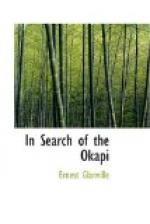Instinctively they all felt the need for caution. The boys had the edge taken off their rash ardour long before, but that sinister warning from the forest in the shape of the arrow had driven home again the lesson that it was necessary to be always on guard.
The forest, in its silence and in its gloom, was menacing. They glanced up the river. It stretched away like an avenue cut out of a solid mass of vegetation, and all the length to the spot where the banks seemed to run together, as if the river had ended, there was no sign of living thing.
Suddenly an animal darted across the clearing and crouched behind Muata. It was the jackal, the hair on its neck erect, and its body quivering with fear, or excitement. Then a branch snapped with a startling report, there was a violent shaking of leaves, a short bark-like roar, and then a noise of shaking gradually decreasing.
Muata had fallen back to the river’s brink at the roar, but now he turned his attention once more to the clearing.
“What was that?”
“Man-monkey,” he said quietly.
“Gorilla! By Jove!” and the boys stared into the forest, and then at each other. “Perhaps he’s gone to call up the others. Will he come back, Muata?”
“Not he,” said Mr. Hume. “He’s just about as frightened as we were. What are the signs, Muata?”
“Wow! Bad—bad signs. These be the bones of men;” and he turned over the ashes with his foot. “They were few who made a home here, and the man-eaters marked them for their own. In the night they fell on the village, killed the men, and rested here while they feasted— rested till the last was eaten; then with the women and the children they went back. That much the signs tell me.”
“Does he mean,” asked Venning, in horror, “that they were cannibals?”
Mr. Hume nodded his head.
“The brutes,” muttered Compton, turning white.
“I don’t wonder,” said Venning, in a whisper. “This place is enough to breed any horror.”
“It will be safe to land,” said the chief, quietly.
“But what of the arrow?”
“That was not shot by a man-eater. It was the arrow of a river-man; maybe the same man loosened it as tied the fetish cloth to the pole, for one has been here since the man-eaters left.”
He put two fingers in his mouth and produced a shrill whistle.
There was no answer; and after a time they all landed to stretch their legs, but the associations of the place, with those grim remains of the cannibal feast, were too terrible, and they did not stay long. As the Okapi resumed her voyage up the sombre defile, a faint whistle sounded on the opposite bank. Muata replied in the same fashion, and called out.
Back from the shadows came a quavering answer. Muata called again, and out from under the roof of leaves, formed by the overhanging branches, shot a tiny craft, with two men in her. The Okapi slowed down, and the little canoe, with many a halt, timidly drew near till the occupants could be clearly seen. One—he who wielded the paddle —was a young man, black as soot, with a shaggy head of frizzled wool, and wild, suspicious eyes. The other, who appeared to be urging the other to more speed, was an old man, whose head was covered by an Arab fez.




